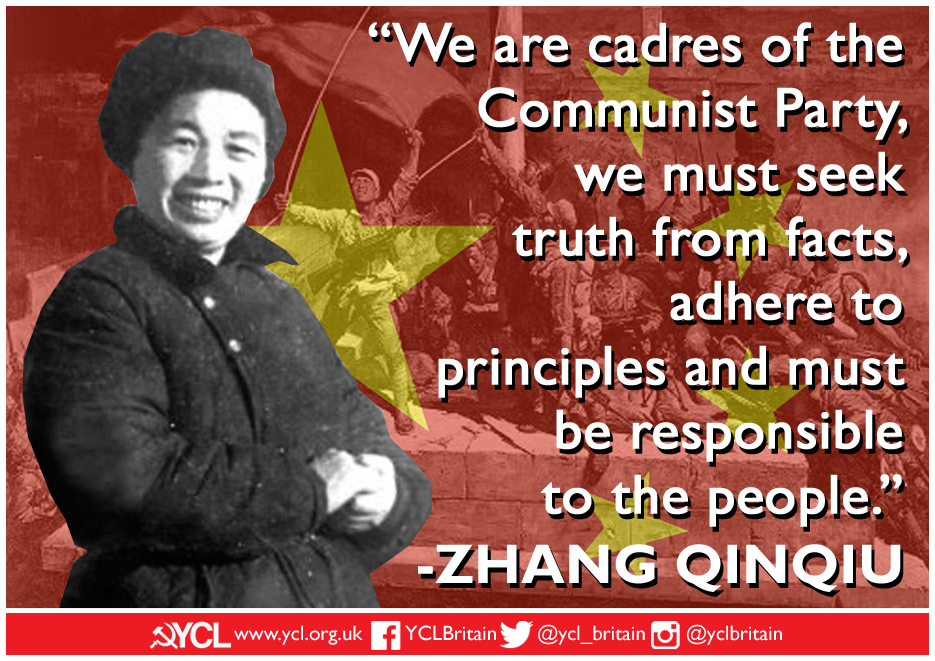 As part of a month long build up to International Women’s Day Celebrations on the 8th of March, the YCL will be publishing daily articles highlighting the exemplary role played by women in the international communist & working class movement.
As part of a month long build up to International Women’s Day Celebrations on the 8th of March, the YCL will be publishing daily articles highlighting the exemplary role played by women in the international communist & working class movement.
Zhang Qinqui was a Chinese Communist Party cadre, general and post-war politician.
YCLers are encouraged to host, support and participate in celebrations locally to bring the message of International Women’s Day into our workplaces, colleges and schools, and communities.
Zhang Qinqui (1904-1968) was born to a wealthy family in Shimen, Tongxiang, Zhejiang Province in Eastern China. She attended an all girls school before moving to Shanghai to attend the city’s left-wing university.
While studying at Shanghai University Zhang met Shen Zemin, one of the earliest members of the Communist Party of China, who was an instructor at the University. She joined the Communist Party of China in November 1924 and was among its first female members. She married Shen Zemin a year after joining the Party.
Along with other leading women Communists Zhang formed a night school for women workers in Shanghai. Later this provided the basis for a Communist led silk workers strike which won new recruits to the Party.
Zhang went to study in the Soviet Union with 100 other Party members. In Moscow she joined the ’28 Bolsheviks’ a group of infulential Communists and future Chinese leaders. She became proficient in Russian after two years of study, and worked as an interpreter for the CPC. She also worked in textile mills to learn production and management methods.
Zhang Qinqui and Shen returned to China in 1930, he was elected to the Central Committee of the CPC, and both moved to the Communist base in in the area between Hubei, Henan and Anhui provinces.
In response to growing Communist strength as the Chinese Civil War got underway, the nationalist Kuomintang forces led by Chiang Kai-shek launched the ‘Encirclement Campaigns’ to trap and destroy Red bases. Communist forces in Zhang’s base decided to breakout and move West to consolidate.
Zhang Qinqiu was appointed Director of the General Political Department of the Fourth Front Army, the highest war-time position ever held by a woman in the Chinese Red Army. She is often referred to the only woman general of the Red Army. Shen was suffering from an acute lung disease and remained at the base. He died in November 1933.
Zhang Qinqui went on in March 1934 to lead the Fourth Army’s Women’s Independent Regiment, commanding 2,000 soldiers. She joined the legendary ‘Long March’ to the North of China where Communist forces would regroup and rebuild. Her Western Route Army was surrounded and defeated. Zhang who had just given birth by her second husband was captured and sent to the capital Nanjing, her child was abandoned.
After the Xi’An Incident led to the formation of a united front between Communist and Nationalist forces against Japanese Imperialism and the impending invasion of more of China following the occupation of Manchuria. Zhang was released and joined Communist forces in Yan’an the capital of the Communist base in Northern China. There she established established a Women’s University, becoming it’s dean. She became a member of the Women’s Committee of the Party’s Central Committee in the 1940’s and the attended the Second International Federation of Democratic Women of 1948 in Budapest.
Following victory of Communist forces in the Chinese Civil War and the establishment of the People’s Republic of China, Zhang Zhang was appointed Vice Minister of Textile Industry, partly because of her earlier experience of organizing textile workers in Shanghai in the 1920s. Zhang was a sad casualty of the Cultural Revolution but was later rehabilitated.
Zhang Qinqui is a true inspiration to the Communist youth and all those struggling for socialism. Her life was dedicated to the revolution and she endured great personal tradegy and hardship in her time. Zhang Qinqui’s story highlights the necessity of women’s liberation forming an essential element of the revolutionary struggle, not only for it to succeed in the first instance but also as the basis for building socialism.